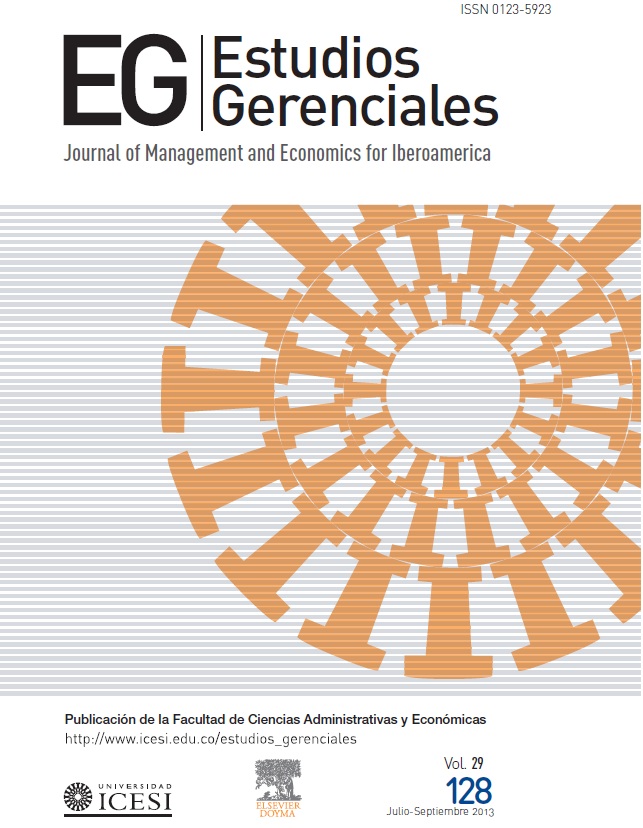Colombia frente a la economía de conocimiento, ¿un callejón sin salida?
DOI:
https://doi.org/10.1016/j.estger.2013.09.006Keywords:
Colombia, Ciencia, tecnología e innovación, sociedad del conocimientoAbstract
Se está ad-portas de la llamada sociedad del conocimiento donde hay una estrecha relación con el desarrollo científico-tecnológico y de innovación de los países. Este artículo trata de establecer si Colombia está preparada para ingresar a esta nueva sociedad. Tras la comparación de varias metodologías de evaluación del conocimiento y la innovación del Banco Mundial y del INSEAD, todo parece indicar que Colombia todavía está lejos de alcanzar niveles por encima de la media mundial en desarrollo científico-tecnológico y la innovación estratégica. Esta situación espera revertirse frente a las políticas y estrategias adoptadas por el Gobierno Colombiano, al incluir la ciencia, tecnología e innovación como una de las locomotoras del Plan Nacional de Desarrollo 2010-2014.Downloads
References
Bortagaray, I. y Scott, T. (2000). Innovation Clusters in Latin America. Paper presented at 4th International Conference on Technology Policy and Innovation.
Brian, J. (1992). Intelligent Enterprise. Boston: The Free Press.
Camargo, M., Rengifo, P. y Serrato, S. (2006). Propuesta para estructurar la gestión del conocimiento en una PYME. Tesis de Grado. Bogotá: Fundación Konrad Lorenz.
Comision Europea (1995). Green Paper on Innovation. Bruselas: European Commission.
Departamento Administrativo Nacional de Estadística (2006). Segunda Encuesta Nacional de Innovación. Bogotá: DANE.
Departamento Nacional de Planeación (2010). Plan Nacional de Desarrollo 2010-2014. Prosperidad para Todos. Bogotá: DNP.
Garnett, R. (1999). New Economics of Knowledge. Londres: Routledge.
Grant, R. M. (1996). Prospering in Dynamically-competitive Environments: Organizational Capability as Knowledge Integration. Organization Science, 7, 375-387.
Håkansson, H. (1987). Corporate Technological Behaviour: Co-operation and Networks. London: Routledge.
INSEAD. (2011). The Global Innovation Index 2011. Accelerating Growth and Development. Soumitra, D., ed, Fontainebleau, Fran INSEAD. Disponible en: http://www.globalinnovationindex.org/gii/
Lundvall, B. (1992). National Systems of Innovation: Towards a Theory of Innovation and Interactive Learning. Londres: Pinter.
Macías, C. y Aguilera, A. (2012). Contribución de la gestión de recursos humanos a la gestión del conocimiento. Estudios Gerenciales, 28, 133-148. Disponible en: http:// www.icesi.edu.co/revistas/index.php/estudios_gerenciales/article/view/1212
Nelson, R. (1993). National Innovation Systems: A Comparative Analysis. Oxford: Oxford University Press.
Nonaka, I. (1994). A Dynamic Theory of Organizational Knowledge Creation. Organization Science, 5, 14-37.
Observatorio Colombiano de Ciencia y Tecnología (2010). Indicadores de ciencia y tecnología, Colombia 2010. Bogotá: Observatorio Colombiano de Ciencia y Tecnología.
Scheel. C. (2002). Knowledge Clusters of Technological Innovation Systems. Journal of Knowledge Management, 6, 356-367.
Scheel, C. (2005). Creating Economic Value Added through Enabling Technologies. Journal of Integrated Design and Process Science, 9, 41-59.
Scheel, C. (2007). Collaborate to Compete: How Clustering Can Change the Rules of Globalization. Positioning Businesses and Industries of Developing Countries into World-class Value Systems. Monterrey: Egade.
Schumpeter, J. (1950). Capitalism, Socialism and Democracy. Nueva York: Harper and Row.
Tapscott, D. y Caston, A. (1993). Paradigm Shift. The New Promise of Information Technology. Nueva York: McGraw-Hill.
Tapscott, D. (1996). The Digital Economy: Promise and Peril in the Age of Networked Intelligence. Nueva York: McGraw-Hill.
Unesco. (2003). Communication of the Ministerial Roundtable on ''Towards Knowledge Societies''. París: Unesco.
Unesco. (2005). Towards Knowledge Societies. Paris, 2005. París: Unesco
Unido. (2003). Innovation and Learning. Viena: Unido.
Von Hippel, E. (1988). The Sources of Innovation. Oxford: Oxford University Press.
Weill, P. A. (2001). Place to Space-Migrating to e-business Models. Harvard: Harvard Business School Press.
World Bank (2005). The Knowledge Economy, the KAM Methodology and World Bank Operations. Washington D. C.: World Bank. Disponbible en: http://www.worldbank.org/kam
World Bank (2007). Building Knowledge Economies: The Critical Role of Education and ICT. Seúl: World Bank.
World Bank (2009). Developing Knowledge Economy Strategies to Improve Competitiveness. Knowledge for Development (K4D). Alejandría, Egipto: World Bank.
Downloads
Published
Issue
Section
License
Articles are the sole responsibility of their authors, and will not compromise Icesi’s University principles or policies nor those of the Editorial Board of the journal Estudios Gerenciales. Authors authorize and accept the transfer of all rights to the journal, both for its print and electronic publication. After an article is published, it may be reproduced without previous permission of the author or the journal but the author(s), year, title, volume, number and range of pages of the publication must be mentioned. In addition, Estudios Gerenciales must be mentioned as the source (please, refrain from using Revista Estudios Gerenciales).








